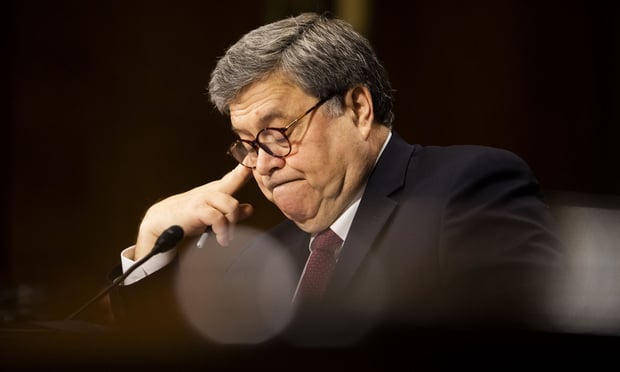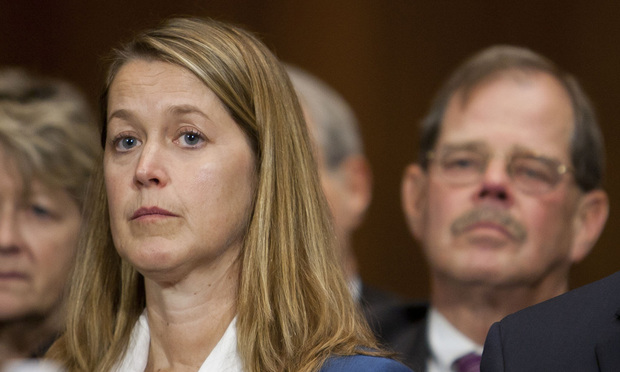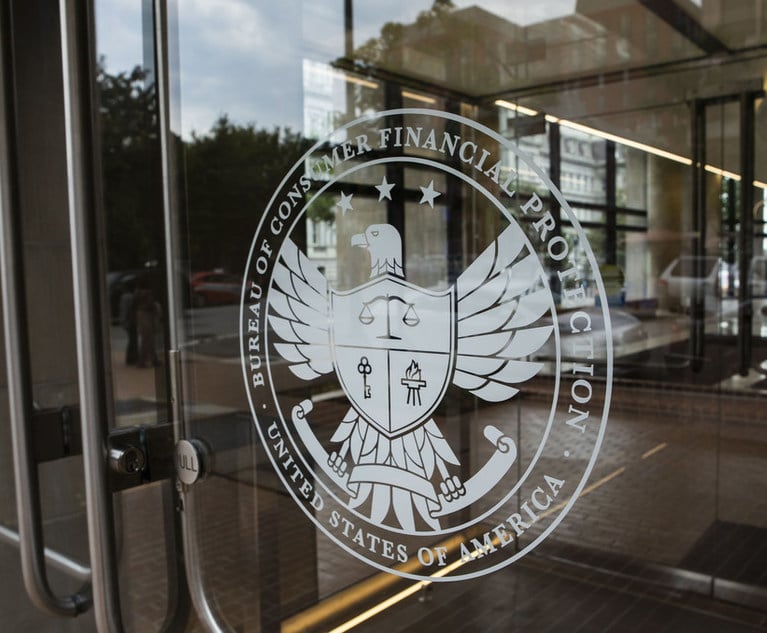New Normal Sets In for White-Collar Lawyers in the Virus Era
"Actually interviewing people as part of an internal investigation, appearing before the government in whatever capacity—that is just not something that lends itself to remote work," a white-collar partner at Quinn Emanuel says.
March 20, 2020 at 12:03 PM
7 minute read
 U.S. Justice Department headquarters in Washington. Photo: Diego M. Radzinschi
U.S. Justice Department headquarters in Washington. Photo: Diego M. Radzinschi
Earlier this month, just a week before lawyers across the country were set to converge on San Diego for a white-collar defense conference, the American Bar Association canceled the annual gathering amid the growing alarm of the novel coronavirus outbreak.
For U.S. law firms, the move was an early taste of how the highly contagious virus would reshape everyday life in the legal profession and beyond—forcing office closures, mass layoffs across industries and government commands to avoid close encounters. But with the gravity of the global health emergency still not yet crystallized, the Washington law firm KaiserDillon quickly arranged a happy hour for one of the evenings white-collar lawyers had expected to spend networking in Southern California.
"It just didn't seem like it was going to move that fast. It seemed like a good idea. Then, watching the world change last week was just remarkable," Matt Kaiser, a partner at the firm, said in an interview this week.
The night before the drink plans, after holding off on reminder emails as the coronavirus crisis worsened, the firm made the call. Social distancing was on, happy hour was off.
"At some point," Kaiser said, going forward with the event "seemed either dangerous or in exceptionally bad taste—or both."
Since the end of last week, major U.S. law firms have largely shuttered, their lawyers and most support staff swept up in the tide of teleworking. A new normal has set in with an unknown end date, presenting indefinite delays and other challenges to lawyers grappling in their own ways with an unprecedented public health emergency.
For white-collar defense lawyers, the international travel required for investigations into foreign bribery and other corporate misconduct has been rendered virtually impossible. And in a practice that prizes in-person meetings—better to gauge a witness' credibility in an interview or take a prosecutor's temperature—virtual communication has become commonplace.
With the grace of a solid WiFi connection, colleagues who were once down the hall are now reachable only via videoconferencing. The teleconferencing service Zoom has emerged as an essential link for work life.
"Actually interviewing people as part of an internal investigation, appearing before the government in whatever capacity—that is just not something that lends itself to remote work," said Sandra Moser, a partner at Quinn Emanuel Urquhart & Sullivan who previously headed the fraud section in the Justice Department's criminal division.
"Frankly, that's why people who are in public service report to work every day," she said.
In interviews, lawyers described the Justice Department and other government agencies as considerate of the new challenges companies are confronting in the coronavirus crisis. Those agencies have found themselves in the same position as their defense bar counterparts, broadly encouraging or even requiring employees to work from home.
One lawyer said a client's FBI interview was canceled, while others pointed to delayed court proceedings and in-person meetings turned into teleconferences.
"So far, it's been my experience that the government's been very understanding and accommodating in view of the current circumstances. They're under the same constraints and face the same challenges as those working outside of government," said Matthew Miner, a partner at Morgan, Lewis & Bockius who served until last year as a deputy assistant U.S. attorney general in the Justice Department's criminal division.
In response to the coronavirus' spread, several law firms took steps to prepare for office closures, arranging test-runs for lawyers and staff to work from home and outfitting them with technology to do so. The outbreak, which the World Health Organization declared last week to be a global epidemic, also spawned new work with clients. Along with assistance with crisis management, some firms have been consulted about addressing fraudulent activity exploiting the public health crisis.
 Attorney General William Barr testifies May 1, 2019. Photo: Diego M. Radzinschi / ALM
Attorney General William Barr testifies May 1, 2019. Photo: Diego M. Radzinschi / ALMOn Monday, U.S. Attorney General William Barr directed prosecutors to prioritize investigations of scammers and others seeking to fraudulently profit from the pandemic.
"Sadly, there are going to be people who try to take advantage of others in these distressing times. That's definitely coming, unfortunately. It's the history of the world," said Gibson, Dunn & Crutcher partner Joel Cohen, a leader of the firm's white-collar defense and investigations group. "The risks for many legitimate businesses is that they might become inadvertently associated with others who are offering a wide range of products or ideas that skirt around the edges of propriety."
With their work on internal investigations, lawyers said they have been forced to weigh whether interviews and other efforts should proceed or be delayed to a later date—considerations that come against the backdrop of uncertainty over when the coronavirus crisis will end.
"There are a handful of situations that you really feel like the person is essential, and that key witness is one you really want to look in the eye," said Jay Holtmeier, a partner at Wilmer Cutler Pickering Hale and Dorr and leader of the firm's anti-corruption practice. "Some of those things are going to have to be put on hold a bit. Some others will not be put on hold but proceed in the second-best way, by videoconference."
"As we all know," he added, "those are not ideal situations. "But if it has to be done, it has to be done."
 Amy Jeffress (File: 2013) Photo: Diego M. Radzinschi / NLJ
Amy Jeffress (File: 2013) Photo: Diego M. Radzinschi / NLJAmy Jeffress, an Arnold & Porter Kaye Scholer partner who previously led the national security division of the U.S. attorney's office in Washington, said videoconferencing necessitated by the coronavirus outbreak "still doesn't capture the dynamics of meeting someone in person or face to face."
"It's not ideal. What we're doing is really deciding whether this is a matter that can wait or is this one we really need to go forward with, even with the limitation of not meeting in person," she said. "But we don't know how long this delay is going to last. We may wait a few weeks and decide to move ahead."
Ropes & Gray partner Joshua Levy in Boston, a leader of the firm's global litigation and enforcement practice, said there was a bit of an early "scramble" among lawyers facing immediate challenges balancing their personal and professional lives. Levy, like many lawyers across law firms and practice groups, is working from home.
Lawyers will adjust, at least for now, to using video technology. Levy predicted that the new dynamic would make the lives of white-collar lawyers harder but not impossible.
'Jarring to miss the camaraderie'
Within U.S. law firms, lawyers are embracing video meetings over teleconference. On the line is continued camaraderie.
Firm leaders at Gibson Dunn have encouraged lawyers and other staff to communicate when possible with Zoom or other technology offering face-to-face communication, albeit with the help of the internet.
"We want to try to encourage personal contact as best we can, even if we can't be in the same room," Cohen said. "We don't have to do it by video, but we think it will be helpful to maintain that connection."
At KaiserDillon, the would-be host of the March 11 happy hour, the coronavirus outbreak has given rise to an optional—and virtual—lunch over Zoom.
"It's jarring to miss the camaraderie, or those regular social interactions. Having the virtual lunch kind of helps with that. We often have people traveling, so in some ways it doesn't seem that different to be calling people who are remote and working with people who are in different parts of the country," Kaiser said.
"The real question we have is how long this is going to last and what this looks like if it lasts longer, a few weeks or months, and what that starts to look like if people in the firm get sick and how we work with that."
NOT FOR REPRINT
© 2025 ALM Global, LLC, All Rights Reserved. Request academic re-use from www.copyright.com. All other uses, submit a request to [email protected]. For more information visit Asset & Logo Licensing.
You Might Like
View All
CFPB Resolves Flurry of Enforcement Actions in Biden's Final Week

Wells Fargo and Bank of America Agree to Pay Combined $60 Million to Settle SEC Probe

Supreme Court May Limit Federal Prosecutions Over 'Misleading' but True Statements

CFPB Alleges Berkshire Hathaway Subsidiary Originated Unaffordable Housing Loans
Law Firms Mentioned
Trending Stories
- 1NJ Supreme Court Clarifies Affidavit of Merit Requirement for Doctor With Dual Specialties
- 2Whether to Choose State or Federal Court in a Case Involving a Franchise?
- 3Am Law 200 Firms Announce Wave of D.C. Hires in White-Collar, Antitrust, Litigation Practices
- 4K&L Gates Files String of Suits Against Electronics Manufacturer's Competitors, Brightness Misrepresentations
- 5'Better of the Split': District Judge Weighs Circuit Divide in Considering Who Pays Decades-Old Medical Bill
Who Got The Work
J. Brugh Lower of Gibbons has entered an appearance for industrial equipment supplier Devco Corporation in a pending trademark infringement lawsuit. The suit, accusing the defendant of selling knock-off Graco products, was filed Dec. 18 in New Jersey District Court by Rivkin Radler on behalf of Graco Inc. and Graco Minnesota. The case, assigned to U.S. District Judge Zahid N. Quraishi, is 3:24-cv-11294, Graco Inc. et al v. Devco Corporation.
Who Got The Work
Rebecca Maller-Stein and Kent A. Yalowitz of Arnold & Porter Kaye Scholer have entered their appearances for Hanaco Venture Capital and its executives, Lior Prosor and David Frankel, in a pending securities lawsuit. The action, filed on Dec. 24 in New York Southern District Court by Zell, Aron & Co. on behalf of Goldeneye Advisors, accuses the defendants of negligently and fraudulently managing the plaintiff's $1 million investment. The case, assigned to U.S. District Judge Vernon S. Broderick, is 1:24-cv-09918, Goldeneye Advisors, LLC v. Hanaco Venture Capital, Ltd. et al.
Who Got The Work
Attorneys from A&O Shearman has stepped in as defense counsel for Toronto-Dominion Bank and other defendants in a pending securities class action. The suit, filed Dec. 11 in New York Southern District Court by Bleichmar Fonti & Auld, accuses the defendants of concealing the bank's 'pervasive' deficiencies in regards to its compliance with the Bank Secrecy Act and the quality of its anti-money laundering controls. The case, assigned to U.S. District Judge Arun Subramanian, is 1:24-cv-09445, Gonzalez v. The Toronto-Dominion Bank et al.
Who Got The Work
Crown Castle International, a Pennsylvania company providing shared communications infrastructure, has turned to Luke D. Wolf of Gordon Rees Scully Mansukhani to fend off a pending breach-of-contract lawsuit. The court action, filed Nov. 25 in Michigan Eastern District Court by Hooper Hathaway PC on behalf of The Town Residences LLC, accuses Crown Castle of failing to transfer approximately $30,000 in utility payments from T-Mobile in breach of a roof-top lease and assignment agreement. The case, assigned to U.S. District Judge Susan K. Declercq, is 2:24-cv-13131, The Town Residences LLC v. T-Mobile US, Inc. et al.
Who Got The Work
Wilfred P. Coronato and Daniel M. Schwartz of McCarter & English have stepped in as defense counsel to Electrolux Home Products Inc. in a pending product liability lawsuit. The court action, filed Nov. 26 in New York Eastern District Court by Poulos Lopiccolo PC and Nagel Rice LLP on behalf of David Stern, alleges that the defendant's refrigerators’ drawers and shelving repeatedly break and fall apart within months after purchase. The case, assigned to U.S. District Judge Joan M. Azrack, is 2:24-cv-08204, Stern v. Electrolux Home Products, Inc.
Featured Firms
Law Offices of Gary Martin Hays & Associates, P.C.
(470) 294-1674
Law Offices of Mark E. Salomone
(857) 444-6468
Smith & Hassler
(713) 739-1250










